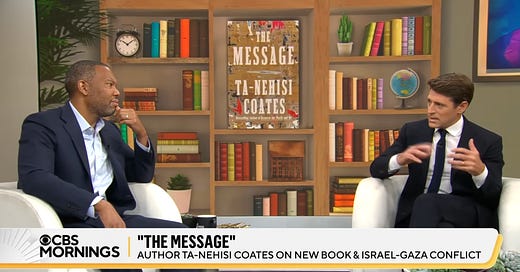Ta-Nehisi Coates Touched the Third Rail
His CBS interview—and the conversation around it—perfectly encapsulate just how indoctrinated this country is when it comes to Israel and Palestine.
In case you haven’t seen the recent interview with Ta-Nehisi Coates on CBS Mornings, let’s start there.
It’s unlikely, I think, that you haven’t heard about it, but I’d wager there’s a decent chance you haven’t watched it. I say that because it took two days—a lifetime in the online universe—for me to actually watch it. I read, conservatively, maybe 50 posts about it before that? And still I wasn’t totally prepared for it.
Coates was there to promote his new book, The Message, a work that aims (according to Coates and marketing materials) to examine how we write about conflict and what that says about us. That exploration is filtered through three specific places: Dakar, Senegal, Columbia, South Carolina, and Palestine.
Coates didn’t get much of an opportunity to talk about the conceit or content of the book during the CBS Mornings interview, though the controversy around his appearance probably did more to promote the book than a normal interview ever would have. Instead, he was repeatedly questioned—Accused? Interrogated?—by host Tony Dokoupil, as co-hosts Gayle King and Nate Burleson sat nearby, largely in silence. (In a subsequent interview, Coates said that King—who didn’t lift her eyes from her notes for about half the segment—had been planning to ask him questions but that Dokoupil had taken up the entire slot by himself.) Clearly, he had touched the third rail.
Dokoupil opened by likening the essay on Palestine to something one might find “in the backpack of an extremist,” and then questioned Coates about his choice to put the Palestinian people at the center of his examination. He asked, “Is it because you just don’t believe that Israel, in any condition, has a right to exist?” Then, he took it even further: “What is it that so particularly offends you about the existence of a Jewish state that is a Jewish safe place?” So, to recap, because Ta-Nehisi Coates wrote an essay about Israeli apartheid—something that every major human rights group agrees is real—he is little more than an antisemitic terrorist.
I cannot presume to know what Coates was thinking as all of this went down over the course of roughly seven minutes. In the first few moments of Dokoupil discussing his own reaction to the Palestine essay, Coates had, in my estimation, the furrowed brow of someone realizing quite quickly what’s happening. He didn’t look surprised exactly, but maybe as if he was resetting expectations. His answers though, were as if he was preparing for this exact scenario to play out.
I’ll resist fully transcribing the exchange, but throughout, Coates stated that his goal is to give voice to the voiceless, and that he is opposed to ethnocratic states of any kind, not just Israel. He also likened the conflict in Gaza to apartheid created by American slavery.
“Either apartheid is right or it’s wrong. It’s really, really simple,” he said.
The interview is jarring and difficult to watch on many levels, but as many have pointed out, it’s also remarkable to witness Coates reassert some very basic moral standards and beliefs as he is asked several ungenerous and frankly unserious questions right in a row about his work, and the situation in Gaza.
The response to the segment was huge. It was written about in the press (The Washington Post called it “impassioned but calm, heartfelt but brief“) and raged about on social media, though honestly, I did not expect anything else to come of it. Dokoupil’s questions may have been more bald-faced than the more run-of-the-mill prejudices that appear in popular new outlets all the time, but those are as regular as clockwork and are rarely, if ever, corrected.
Then, on Monday, came a very, very surprising twist in the story—one that raises all sorts of interesting questions about the future of Israel-Palestine coverage.
Keep reading with a 7-day free trial
Subscribe to Discourse Blog to keep reading this post and get 7 days of free access to the full post archives.





